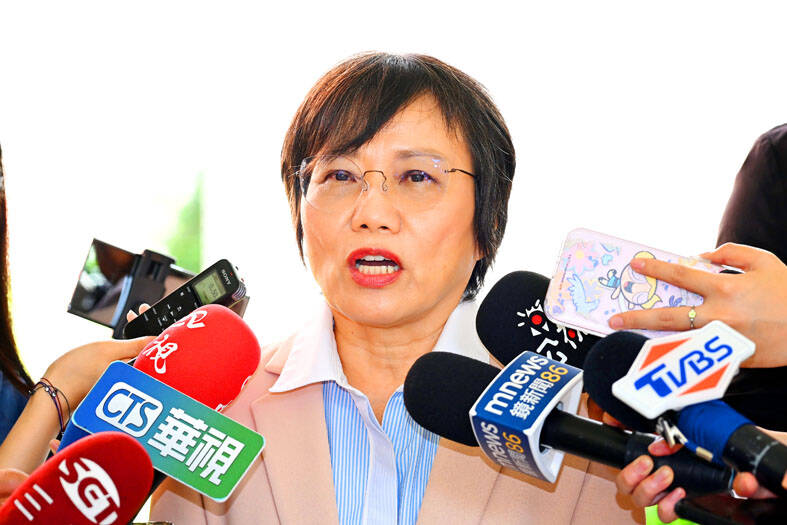The government considers Taiwan People’s Party (TPP) legislator-at-large nominee Li Zhenxiu (李貞秀), who is a Chinese citizen, not eligible to be a lawmaker, Minister of the Interior Liu Shyh-fang (劉世芳) said yesterday.
Liu made the remarks on the sidelines of a Legislative Yuan meeting, telling reporters that she stood by her comment the previous day that Taiwan “recognizes” China as a foreign nation.
The TPP has tapped Lee as a possible replacement for one of the party’s two legislators-at-large in line with founder and former chairman Ko Wen-je’s (柯文哲) promise that these seats would change hands every two years.

Photo: Chen Yi-kuan, Taipei Times
Liu said the law forbids officials from holding citizenship in any nation other than Taiwan, spurring TPP response that China is legally defined as the “Mainland area,” not a state.
The People’s Republic of China (PRC) is a foreign nation, and Taiwan and China are independent and equal nations, she said.
Elected officials, who must swear loyalty to the nation before assuming office, are not allowed to have dual citizenship, she said.
Li could become a lawmaker by renouncing her Chinese citizenship and presenting Straits Exchange Foundation-certified proof within a year of assuming office, she said.
Liu also clarified what she meant when she said on Monday that Taiwan “recognizes” the PRC, a day after she triggered a political backlash.
Ma Ying-jeou Foundation director Hsiao Hsu-tsen (蕭旭岑) said Liu made an unconstitutional remarks and should resign.
Liu said her comment the day before was made “from the standpoint of the government of the Republic of China (ROC)” — referring to Taiwan’s official name — and focused on how the Ministry of the Interior applies the law.
“Foreign nationals, including Chinese nationals,” must renounce foreign nationality to hold public office in Taiwan, she said.
If the renunciation of PRC nationality is recognized by the Straits Exchange Foundation, a semi-official organization that handles interactions between Taiwan and China, the government would “recognize it as a valid official document,” she said.
“To serve in public office, one must be loyal to a single country: the ROC,” she said
Asked whether the PRC is considered a country according to the Constitution, Liu said that “the ROC and the PRC are not subordinate to each other.”
The government “recognizes” the PRC insofar as it recognizes PRC documents, including those issued by the Beijing-affiliated Association for Relations Across the Taiwan Straits, as “effective legal documents.”
The minister also commented on the dismissal from office of Deng Wanhua (鄧萬華), who was the warden of Syuetian Village (學田) in Hualien County’s Fuli Township (富里), for holding PRC nationality.
The eligibility of PRC-born spouses of Taiwanese to run for office is regulated by the Act Governing Relations Between the People of the Taiwan Area and the Mainland Area (臺灣地區與大陸地區人民關係條例) and the Nationality Act (國籍法), she said.
Four other village wardens face similar issues, because they renounced their household registration too late, possibly due to “limited understanding of the law.”
She urged local governments to provide legal guidance in such circumstances.
Premier Cho Jung-tai (卓榮泰) said that Taiwan’s position “on the front line of geopolitics” requires a more active approach in handling cross-strait relations and peace in the Indo-Pacific region.
He said that “if both sides — the PRC and the ROC — can face the reality of each other’s existence and even legal equality, it will help promote peace.”

Nipah virus infection is to be officially listed as a category 5 notifiable infectious disease in Taiwan in March, while clinical treatment guidelines are being formulated, the Centers for Disease Control (CDC) said yesterday. With Nipah infections being reported in other countries and considering its relatively high fatality rate, the centers on Jan. 16 announced that it would be listed as a notifiable infectious disease to bolster the nation’s systematic early warning system and increase public awareness, the CDC said. Bangladesh reported four fatal cases last year in separate districts, with three linked to raw date palm sap consumption, CDC Epidemic Intelligence

Two Taiwanese prosecutors were questioned by Chinese security personnel at their hotel during a trip to China’s Henan Province this month, the Mainland Affairs Council (MAC) said yesterday. The officers had personal information on the prosecutors, including “when they were assigned to their posts, their work locations and job titles,” MAC Deputy Minister and spokesman Liang Wen-chieh (梁文傑) said. On top of asking about their agencies and positions, the officers also questioned the prosecutors about the Cross-Strait Joint Crime-Fighting and Judicial Mutual Assistance Agreement, a pact that serves as the framework for Taiwan-China cooperation on combating crime and providing judicial assistance, Liang

Reports of Taiwanese going missing, being detained or interrogated, or having their personal liberties restricted in China increased about fourfold annually last year, the Mainland Affairs Council (MAC) said yesterday. Last year, 221 Taiwanese who traveled to China were reported missing, were detained and interrogated, or otherwise had their personal freedom restricted, up from 55 the previous year, the council said. Reopening group tours to China would be risky, as it would leave travelers with no way to seek help through official channels after Beijing shut down dialogue between the associations tasked with handling cross-strait tourism, the MAC said. Taipei’s Taiwan Strait Tourism

SHIFT: Taiwan is evolving from a transit stop into a tourist destination, with more international travelers willing to spend on tours, dining and cultural activities Taiwan rose three places in the World Tourism Barometer to 36th globally in 2024, with international tourism revenue of US$10.028 billion, the Tourism Administration said on Monday. The UN Tourism Organization publication said that its focus has switched from whether a country has returned to pre-COVID-19 levels of tourism to the amount spent by a tourist during an overseas trip. The nation last year welcomed 8.57 million international tourists, about 9 percent more than in 2024, with most tourists coming from Japan, South Korea, and Hong Kong and Macau, all of which accounted for at least 1 million tourists each. During the first